新概念第二册第25课课件
合集下载
新概念二25课件
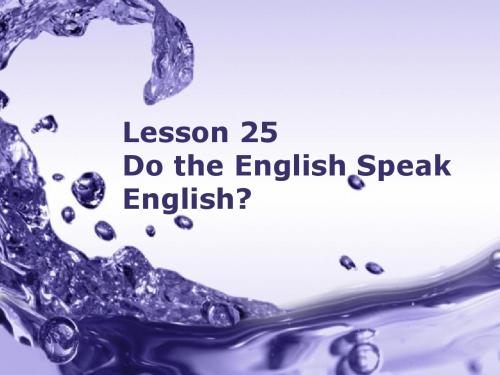
• We must all help each other. • 我们大家都必须互相帮助。
Powerpoint Templates
Page 10
课文详注 Further notes on the text
• I arrived in London at last. 我终于到了伦敦。 • • (1)这里London前面不加冠词,介词in暗指London是个大地方。 (2)at last为固定短语,表示"终于",一般暗指经过一番等待、 麻烦(苦恼)或努力之后:
• It was my turn at last. • 终于轮到我了。
• I repeated my question several times and at last he understood. • 我把问话重复了很多遍。他终于听懂了。
Powerpoint Templates
Page 11
课文详注 Further notes on the text
• I met neither Jane nor her husband. • 简和她的丈夫我都没见到。(连接两个宾语)
Powerpoint Templates
Page 14
课文详注 Further notes on the text
• My teacher never spoke English like that! 我的老 师从来不那样讲英语!
@WPS官方微博 @kingsoftwps
Powerpoint Templates
Page 5
词汇学习 Word study
• (3)n.奇迹,奇观,奇才;惊奇,惊讶: • Jane is a wonder. She never fails in her examinations. • 简是个奇才。她从来没有考试不及格过。 • She looked at the boss in wonder. • 她惊讶地看着老板。 • the seven wonders of the world in ancient times • 世界古代7大奇观
新概念英语第二册25课课件

Each person speaks a different language in England.
The Text
Answer the questions • ⑥ Do they understand each other or not? Do
you understand them?
They understand each other but I don’t understand them.
dance D. why do the Chinese people eat rice
dumplings at Dragon Boat Festival
New words and expressions
2. wonder n. 惊奇,惊异;奇事,奇迹
【2012年镇江】15. I wonder ________. A. if Dr Ma still works on the ORBIS plane B. how much does the tallest man in the world weigh C. when Audrey Hepburn had entered the film
课文解析
The Text
1. I arrived in London at last.
【语言点】
arrive at+ 小地点;arrive in+ 大地点
reach vt. 到达……(直接加地点)
get to+宾语 到达……
【注意】home/there/here等地点副词前
不加介词
到家 get home
New words and expressions
1. several adj. 几个,若干
The Text
Answer the questions • ⑥ Do they understand each other or not? Do
you understand them?
They understand each other but I don’t understand them.
dance D. why do the Chinese people eat rice
dumplings at Dragon Boat Festival
New words and expressions
2. wonder n. 惊奇,惊异;奇事,奇迹
【2012年镇江】15. I wonder ________. A. if Dr Ma still works on the ORBIS plane B. how much does the tallest man in the world weigh C. when Audrey Hepburn had entered the film
课文解析
The Text
1. I arrived in London at last.
【语言点】
arrive at+ 小地点;arrive in+ 大地点
reach vt. 到达……(直接加地点)
get to+宾语 到达……
【注意】home/there/here等地点副词前
不加介词
到家 get home
New words and expressions
1. several adj. 几个,若干
新概念-2-Lesson25-By-TurnerPPT课件
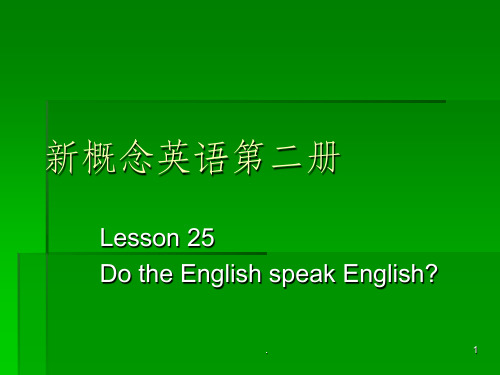
.
4
railway ['reɪlweɪ]
▪ n.铁路(BrE) = railroad(AmE)
▪ 表示道路的单词: ▪ highway, freeway, expressway, ▪ motorway highway:公路
▪ motorway(BrE) = freeway(AmE) :高速公路
▪ express:除了v.表达以外,还可以用作adj,表示快速的、特快的
▪ ②陌生的
▪ e.g. The subject is foreign to us.
▪ Adj.+er→n.
▪
strange→stanger
▪
foreign→foreigner
▪
light→lighter(打火机)
.
14
wonder
▪ n.奇观 ▪ 世界七大奇观:the seven great wonders in the world ▪ What a wonder!多么奇妙
petrol station
gas station
.
9
New words and expressions
▪ porter:n.(火车站等)行李搬运工 ▪ 旅客、俱乐部的服务员 ▪ bellboy (AmE) / pageboy(BrE)
.
10
.
11
.
12
several :adj. = some = a few
EMS = express mail service ▪ expressway快速通道 (主要指城市内的,例如高架桥)
▪ BRT = Bus Rapid Transit
.
5
.
6
新概念第二册第二十五课ppt课件
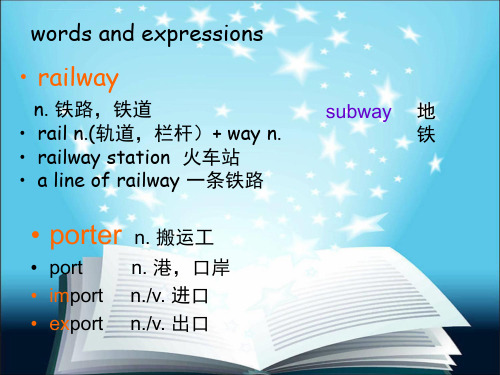
1. 我想知道她什么时候能来。 I wonder when she will come.
2. 不知道为什么仓库今天关门了。 I wonder why the warehouse is closed today.
3. 我在想你会不会帮我。 I’m wondering if you could help me.
• I wonder.
I am not sure.
采用PP管及配件:根据给水设计图配 置好PP管及配 件,用 管件在 管材垂 直角切 断管材 ,边剪 边旋转 ,以保 证切口 面的圆 度,保 持熔接 部位干 净无污 物
each更强调个人或个别, every更强调全体或全部 Everyone has to take part in the meeting, and each should give us a short speech.
采用PP管及配件:根据给水设计图配 置好PP管及配 件,用 管件在 管材垂 直角切 断管材 ,边剪 边旋转 ,以保 证切口 面的圆 度,保 持熔接 部位干 净无污 物
words and expressions
• railway
n. 铁路,铁道 • rail n.(轨道,栏杆)+ way n. • railway station 火车站 • a line of railway 一条铁路
Do English speak English?
British people
a language
The United Kingdom of Great Britain
North Ireland
Welsh
Scotland England
采用PP管及配件:根据给水设计图配 置好PP管及配 件,用 管件在 管材垂 直角切 断管材 ,边剪 边旋转 ,以保 证切口 面的圆 度,保 持熔接 部位干 净无污 物
2. 不知道为什么仓库今天关门了。 I wonder why the warehouse is closed today.
3. 我在想你会不会帮我。 I’m wondering if you could help me.
• I wonder.
I am not sure.
采用PP管及配件:根据给水设计图配 置好PP管及配 件,用 管件在 管材垂 直角切 断管材 ,边剪 边旋转 ,以保 证切口 面的圆 度,保 持熔接 部位干 净无污 物
each更强调个人或个别, every更强调全体或全部 Everyone has to take part in the meeting, and each should give us a short speech.
采用PP管及配件:根据给水设计图配 置好PP管及配 件,用 管件在 管材垂 直角切 断管材 ,边剪 边旋转 ,以保 证切口 面的圆 度,保 持熔接 部位干 净无污 物
words and expressions
• railway
n. 铁路,铁道 • rail n.(轨道,栏杆)+ way n. • railway station 火车站 • a line of railway 一条铁路
Do English speak English?
British people
a language
The United Kingdom of Great Britain
North Ireland
Welsh
Scotland England
采用PP管及配件:根据给水设计图配 置好PP管及配 件,用 管件在 管材垂 直角切 断管材 ,边剪 边旋转 ,以保 证切口 面的圆 度,保 持熔接 部位干 净无污 物
新概念英语第二册Lesson25课 课件(共43张)

Listen to the tape once
arrive
arrive reach get arrive vi.
arrive at:小地点,arrive in;大地点 When will you arrive ______ Beijing? I arrived ______ the bus stop at five o’clock.
know sth. well 对……很熟悉 I know the boy well.
like
Like prep.,表示“像,像……一样” There’s no one like you. 没有人像你一样。 He speaks like a foreigner. like v. walking / would like to go at last/ finally/ in the end
Guessing Game:
1. Who is he / she? 2. Which city does he/ she come from? 3. What is his/her nationality? 4. What does he / she do? 5. What language does he / she speak?
并列句(compound sentence):
把两个或几个简单句
用并列连词连接起来,
则成为一个并列句。
I turned on the TV. I watched it.
I turned on the TV and
并列句
watched it.
I bought my sister a present.
reach vt.后面一定要加宾语 When will you reach Beijing? I reached the bus stop at five o’clock.
新概念英语第二册Lesson 25 (共38张PPT)
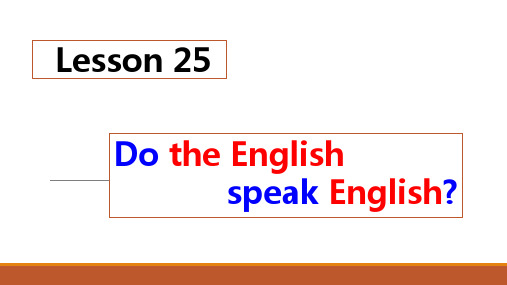
railway n. 铁路;火车站 railway station porter n. 搬运工 several . 几个 表示数量:
some, several, a great number of…
some: 一些, 即可以修饰可数, 又可以修饰不可数 several: 只能修饰可数=a number of(一些) a great number of : 大量的(可数名词)
When will you get to Beijing? How can I get there? get home:到家,get there:到那 home/there都是副词,副词跟动词连用 的时候不需要加介词 I arrived there at last.
I reached the bus stop at five o’clock.
2. I have an apple. Either of you can take it. I want to eat it. Neither of you can take it.
句中either….or…是连词, 意为” 或…或…,是…还是…, 不是…就是…” Either my father or my mother cooks dinner on weekdays 常见的结构有. 1. 连接并列主语, 谓语一般和邻近的主语一致.
His name is Ken. He comes from Handan. He is a Chinese. He is good at (擅长)teaching English. He is a great teacher. He speaks English well.
scientist / English
wonder + if 是否 我想知道你是否有空。 I wonder if you have any spare time. wonder+特殊疑问词 我想知道现在几点了。 I wonder what time it is.
新概念英语第二册课件Lesson 25(PPT)
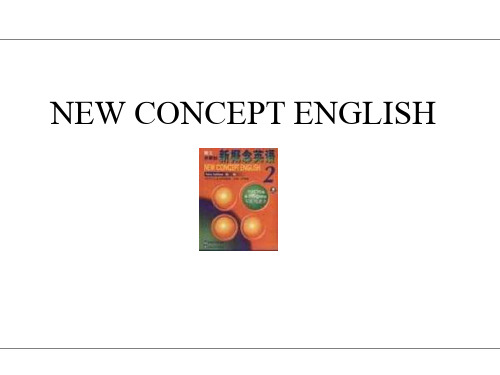
2 . Did he understand you at last or not? Could you understand his answer? ( but)
3 . Did your teacher ever speak English like that or not? 4 . What did the porter say to you?
English亦可作形容词,表示“英格兰的”“英国 的”“英国人的”等
He was English.
I arrived in London at last. He arrived at the airport an hour ago.
At last表示“终于”,一般暗指经过一番等、麻 烦或努力以后终于得到或做到。
6. 不知道为什么博物馆今天关门了。 I wonder why the museum is closed today.
7. 我在想你会不会帮我。 I’m wondering if you could help me.
8. 这是个巨大的奇迹。 It’s a great wonder.
Key words
Do the English speak English? English在这里均为名词,但意义不同。第一个 指____,为总称,后面的动词必须用复数; 第二个指____ 。指语言时前不加冠词,指人 时则要加the:
The English often talk about _____.
Do you speak English?
3. 当either …or和neither … nor连接主语时,谓语 动词与后一个主语保持一致。
Neither Liz nor I teach mathematics.
3 . Did your teacher ever speak English like that or not? 4 . What did the porter say to you?
English亦可作形容词,表示“英格兰的”“英国 的”“英国人的”等
He was English.
I arrived in London at last. He arrived at the airport an hour ago.
At last表示“终于”,一般暗指经过一番等、麻 烦或努力以后终于得到或做到。
6. 不知道为什么博物馆今天关门了。 I wonder why the museum is closed today.
7. 我在想你会不会帮我。 I’m wondering if you could help me.
8. 这是个巨大的奇迹。 It’s a great wonder.
Key words
Do the English speak English? English在这里均为名词,但意义不同。第一个 指____,为总称,后面的动词必须用复数; 第二个指____ 。指语言时前不加冠词,指人 时则要加the:
The English often talk about _____.
Do you speak English?
3. 当either …or和neither … nor连接主语时,谓语 动词与后一个主语保持一致。
Neither Liz nor I teach mathematics.
新概念二Lesson 25课件
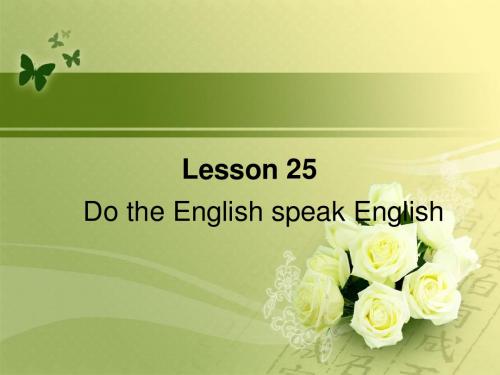
Key structures
并列句中的语序 通过并列连词可以把几个简单句连接起来构成一个并列句。在并列句中,各分句 要根据上下文的要求按逻辑次序排列,但各分句都同等重要并独立存在。 并列连词可以用来表示另加(and)、对比(but,yet)、选择(or)、连续 (and,then)以及结局或结果(so)。 however 用在句号的后面, 单独成句, 于前边的句子只有意思上的承接, 没有语法 上的承接, 语法上的承接表转折只能用 but 一些并列句的连词:and,and then,but,so,yet,or,not only…but…as well 不 但……而且……,neither…nor… 既不……也不……,either…or… 或者……或 者……, both…and… 两者都 yet adv. 然而 放在句末或句中, 与否定句, 疑问句相连, 并且与现在完成时用得比较多 Have you finished yet? yet=but 连词,放在两个句子间, 起转折作用 or adv. 或者, 否则 Hurry up ,you will be late. /Hurry up,or you will be late.
Text analysis
• 3、The railway station was big, black and dark. • 并列的表达方式中前面都是用逗号隔开, 最后两个用and连接 • balck 颜色(建筑物) The room is black. • dark 没有光线 It is dark. • 4、I did not know the way to my hotel, so I asked a porter. • the way to … 通往……路 • Can you tell me the way to… • I don't know the way to…. Can you tell me how to get there? • I don't know the way to the school and where is it? • I know the way. • know sth. well 对……很熟悉 I know the boy well. • 5、I not only spoke English very carefully, but very clearly as well. • not only...but...as well= not only…but also… 不但……而且…… • I can speak not only Chinese but English as well. • Mary not only found her aunt, but stayed with her for two weeks as well. • Not only you but also I will go there.主语并列(一般不这么用)
新概念2第二十五课PPT演示课件
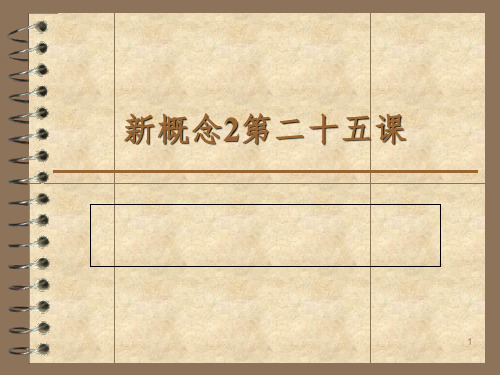
the English 英国人
England (n.)英国
12
二、words
2、language(n.)语言 3、the train station 火车站 the railway station 火车站 the bus station 公交站 the subway station 地铁站 the gas station 加油站 the police station 警察局 the weather station 气象站 the fire station 消防站
8
练习二
1、用such造句 他是一个如此优秀的学生以至于他常
常取得好成绩。 He is such a good student that he always
gets good grades 2、用too…to造句 她太老了,不能在做家务了。 She is too old to do the housework.
13
二、words
4、foreign(adj.)外国的
foreigner(n.)外国人
5、carefully(adj.)仔细的,认真的
careful(adj.)
careless(adj.)粗心大意的
care(v.) care about sb./sth.在乎……
(n.)take care of
7
四、连词补丁(A)
1、so\such………that+句子(如此…以至于) 2、too……to do (太………而不能)
四、连词补丁(B)
1、so与such的区别
such a good student
such good students 必有名词
such hot weather
新概念英语第二册Lesson25dotheEnglishspeakEnglish课件

Words and phrases
1. English n. 英语(不加冠词) adj. 英国的,英国人的
the English=the English people (pl.) 英国人(英格兰人) the British 英国人(英格兰人、爱尔兰人、苏格兰人、威尔士人) Englishman---Englishmen 英国人 Englishwoman---Englishwomen 英国人 eg: .Do you speak English?
/5sev[r[l / /5fCrIn[ / /5wQnd[/
n.铁路 n.搬运工 quantifier.几个 n.外国人 v.感到奇怪
Look, listen and answer
Q1: Where did the writer arrive? Q2: Why couldn’t the writer understand the porter? Q3: Why does the writer wonder?
.The English often talk about the weather. .He was English. 与English相似的单词有: French, Chinese, Japanese等。
Words and phrases
2. wonder vt. vi. 感到惊讶, 感到怀疑,想知道 wonder at 对…感到惊讶 wonder +宾语从句 eg: . I wonder at his rudeness. . I wonder who he is. . I wonder when she will come. . I’m wondering if you could help me. . They wondered why there was a modern building in that district.
新概念第二册英语 Lesson 25 课件

YOUR TITLE
在此输入您的标题
Lorem ipsum dolor sit amet, consectetur adipisicing elit, sed do eiusmod tempor incididunt ut labore et dolore magna aliqua.
Ut enim ad minim veniam, quis nostrud exercitation ullamco laboris nisi ut aliquip ex ea commodo consequat.
Ut enim ad minim veniam, quis nostrud exercitation ullamco laboris nisi ut aliquip ex ea commodo consequat.
Duis aute irure dolor in reprehenderit in voluptate velit esse cillum dolore eu fugiat nulla pariatur. sunt in culpa qui officia deserunt mollit anim id est laborum.
Ut enim ad minim veniam, quis nostrud exercitation ullamco laboris nisi ut aliquip ex ea commodure dolor in reprehenderit in voluptate velit esse cillum dolore eu fugiat nulla pariatur. sunt in culpa qui officia deserunt mollit anim id est laborum.
新概念2lesson25

wonder v.
wonder n. 奇观 : It‘s a wonder./eight wonders wonderful adj 极好的 wonder ① wonder at sth.对...事情感奇怪 ② want to know 想要知道: I wonder
wonder v.
no wonder : 难怪 wonder n. : 奇观 wonderful : 极好的 wonder v.感到奇怪, wonder at wonder : want to know : 想知道 I wonder if you have friend. I wonder how many friends you have.
abroad.
get home:到家, get there : 到那
The railway station was big, black and dark.
balck : 颜色(建筑物). The room is black. dark : without light.没有光线 : It is dark.
I did not know the way to my
not only, 放在动词的前面 一般遇到实义v.和非实义v.的时候, 习惯放在两者之间
I can not only speak Chinese but English as well.(更习惯的说法)
I not only like my mother but my father as well.
I arrived in London at last. The railway station was big, black and dark. I did not know the way to my hotel, so I asked a porter. I not only spoke English very carefully, but very clearly as well. The porter, however, could not understand me. I repeated my question several times and at last he understood. he answered me, but he spoke neither slowly nor clearly. 'I am a foreigner,' I said. Then he spoke slowly, but I could not understand him. My teacher never spoke English like that! The porter and I looked at each other and smiled. Then he said something and I understood it. 'You'll soon learn English!' he said. I wonder. In England, each person speaks a different language. The English understand each other, but I don't understand them! Do they speak English?
wonder n. 奇观 : It‘s a wonder./eight wonders wonderful adj 极好的 wonder ① wonder at sth.对...事情感奇怪 ② want to know 想要知道: I wonder
wonder v.
no wonder : 难怪 wonder n. : 奇观 wonderful : 极好的 wonder v.感到奇怪, wonder at wonder : want to know : 想知道 I wonder if you have friend. I wonder how many friends you have.
abroad.
get home:到家, get there : 到那
The railway station was big, black and dark.
balck : 颜色(建筑物). The room is black. dark : without light.没有光线 : It is dark.
I did not know the way to my
not only, 放在动词的前面 一般遇到实义v.和非实义v.的时候, 习惯放在两者之间
I can not only speak Chinese but English as well.(更习惯的说法)
I not only like my mother but my father as well.
I arrived in London at last. The railway station was big, black and dark. I did not know the way to my hotel, so I asked a porter. I not only spoke English very carefully, but very clearly as well. The porter, however, could not understand me. I repeated my question several times and at last he understood. he answered me, but he spoke neither slowly nor clearly. 'I am a foreigner,' I said. Then he spoke slowly, but I could not understand him. My teacher never spoke English like that! The porter and I looked at each other and smiled. Then he said something and I understood it. 'You'll soon learn English!' he said. I wonder. In England, each person speaks a different language. The English understand each other, but I don't understand them! Do they speak English?
新概念二25课课件
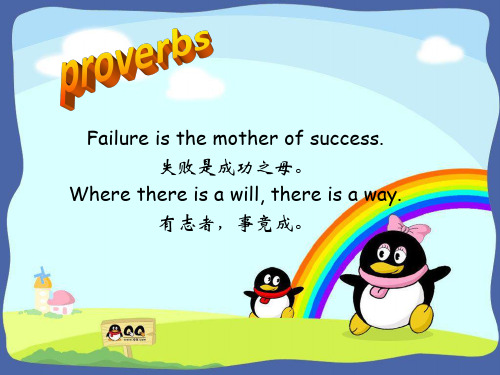
n.
搬运工
几个
n.
外国人
wonder
v.
感到奇怪
New words and expressions
*railway n. 铁路 railway station 火车站 jump the rail 出轨 *porter n.(车站、机场)搬运行李的人 搬运夫 挑夫 port n. 港口 clear a port 出港 enter a port 入港 Any port in a storm. 【谚】慌不择路。
*He answered me, but he spoke neither slowly nor clearly. neither…nor… 既不,也不 *‘ I am a foreigner, ’ I said. *Then he spoke slowly, but I could not understand him. *My teacher never spoke English like thked at each other and smiled.
*Then he said something and I understood it. *‘ You will soon learn English!’ he said. *I wonder. In England, each person speaks a different language. *The English understand each other, but I don’t understand them! *Do they speak English?
Thirdly, crossing the road. Be careful. The traffic moves on the left side of the road in this country. Use the crossing for walking and do not take any chances(冒险) when crossing the road. The next thing is about litter. It is against the law to throw away anything useless in a public place. When you have something to throw away, please put it in your pocket and take it home, or put it in a litter-bin. Finally, I’ll talk about smoking. It is against the law to buy cigarettes if you are under 16 years of age.
新概念英语第二册Lesson25课件

Lesson 25 Do the English speak English? 重难点巩固
I wonder. In England, each person speaks a different language(语言). ①wonder 想知道/感到奇怪; wonderful 精彩的/令人惊奇的 →I wonder how did they came here. 我想知道他们是怎么来这里的。 →The Greenwood Boys gave us a wonderful performance last night. ②each (2者或以上中的每一个, 可单独用, 也可each of)
foreigner外国人
like that 那样地
each other相互
smile(名动一体)微笑
smile at ... 对......微笑
wonder 想知道/感到奇怪
wonderful 精彩的/令人惊奇的
each of ... ......中的每一个
clearly 清晰地/易懂地/显然地
each用于复数主语后,谓语动词用复数
Lesson 25 Do the English speak English? 重难点巩固
He answered me, but he spoke neither slowly nor clearly. ①neither...nor意为“两者都不”,全部否定,谓动遵循靠近原则,即nor后面的主语决定。 →Neither Tom nor I am a football player. 汤姆和我都不是足球运动员。 →He neither drinks nor smokes. 他既不喝酒也不抽烟。 ②neither of + 复数 + 动词单数形式 (注意: 不管是什么复数,谓动都用单数形式) →Neither of us speaks English. 我们俩都不说英语。 →Neither of the girls is from the UK. 这两个女孩都不是来自英国的。 ③neither/nor引导倒装句,表示和前面的情况一致,而且前面为否定句。 →I haven’t had dinner. Neither has he. 我还没吃过晚饭。他也没有。 →Jenny doesn’t like that. Nor do I. 珍妮不喜欢那样。我也没有。 [翻译]: 我妈妈和我都不喜欢钓鱼。[翻译]: 他俩都不吃海鲜。 [翻译]: 他们没写作业。我也没写。[翻译]: 她不会来的。Mike也不会。
新概念英语第二册 Lesson 25课件
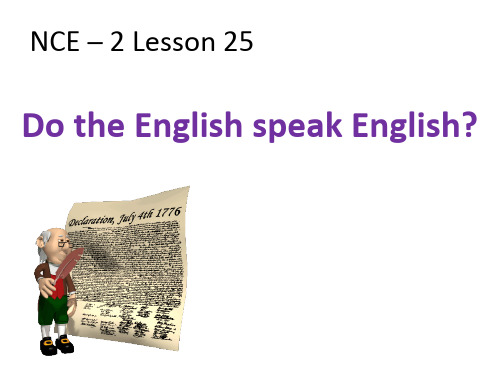
➢我哭了,但是他们什么也没说。 ➢I cried, but they didn’t say anything.
并列句(compound sentence):
➢He teaches English, I teach English. ➢He teaches English and I teach English too. ➢He teaches English and so do I. ➢both...and ➢Both he and I teach English. ➢Mom is a manager. Dad is a manager. ➢Both mom and dad are managers. ➢我吃了一个蛋糕。Sam吃了一个蛋糕。 ➢Both he and I ate a cake.
iarrivedinlondonatlasttherailwaystationwasbigblackanddarkblackanddark又黑又暗blackandblue青一块紫一块arrivedin大地方arrivedat小地方atlast强调努力的结果intheend表示一种结局finally次序上的最后工作不仅是为了赚钱也是为了生活workingisnotonlyformakingmoneybutalsoforlife2
NCE – 2 Lesson 25
Do the English speak English?
Guessing time
singer / Chinese
scientist / English detective/ Japanese
Henry Norman Bethune/ doctor
French/ English
并列句(compound sentence):
并列句(compound sentence):
➢He teaches English, I teach English. ➢He teaches English and I teach English too. ➢He teaches English and so do I. ➢both...and ➢Both he and I teach English. ➢Mom is a manager. Dad is a manager. ➢Both mom and dad are managers. ➢我吃了一个蛋糕。Sam吃了一个蛋糕。 ➢Both he and I ate a cake.
iarrivedinlondonatlasttherailwaystationwasbigblackanddarkblackanddark又黑又暗blackandblue青一块紫一块arrivedin大地方arrivedat小地方atlast强调努力的结果intheend表示一种结局finally次序上的最后工作不仅是为了赚钱也是为了生活workingisnotonlyformakingmoneybutalsoforlife2
NCE – 2 Lesson 25
Do the English speak English?
Guessing time
singer / Chinese
scientist / English detective/ Japanese
Henry Norman Bethune/ doctor
French/ English
并列句(compound sentence):
新概念二-第25课课件

Practice
根据首字母或汉语提示完成句子。
1.He is not from this country; he is a f
.
2.No
(奇怪)you’ve made such great progress.
3. Excuse me. Could you tell me the way to the r
·★2.foreigຫໍສະໝຸດ er(1.6)/'forina/n.外国人
e.g. a blue-eyed foreigner 蓝眼睛外国人 foreign:adj. ①外国的,海外的 外国留学生:foreign students 洋货:foreign goods 外交事务:foreign affairs 外交政策:foreign policy ②the same meaning as strange e.g. The subject is foreign to us. Adj.+er→n. strange→stanger foreign→foreigner
Do you speak English? 你会讲英语吗? English还可以作形容词,表示“英格兰的”、“英国的”、“英国人的”等: He was English. 他是个英国人。 与English相似的单词有French,Chinese,Japanese等: I said good morning to him in French.我用法语向他问早上好。
repeated my question several times and at last he understood. 我把问话重复了很多遍。他终于听懂了。
3.Idid not know the way to my hotel… 我不知道去饭店的路该怎么走…… my hotel不是指属于我的饭店(或旅馆),而是指我已订了房间或者要去住的饭店。
- 1、下载文档前请自行甄别文档内容的完整性,平台不提供额外的编辑、内容补充、找答案等附加服务。
- 2、"仅部分预览"的文档,不可在线预览部分如存在完整性等问题,可反馈申请退款(可完整预览的文档不适用该条件!)。
- 3、如文档侵犯您的权益,请联系客服反馈,我们会尽快为您处理(人工客服工作时间:9:00-18:30)。
He answered me, but he spoke neither slowly nor clearly. neither...nor... 既不...也不...(两者都不...)
Neither he nor I am tall. (用neither…nor…连接并列主语时,谓语则 随最后一个主语的人称和数而变,就近原则) She neither knows nor cares what they say.
2.The child hid behind his mother's skirt. He was afraid of the dog. The child hid behind his mother's skirt,for he was afraid of the dog.
He made a promise.He didn’t keep it. He made a promise,but He didn’t keep it. Mary is opening the door. John is greeting her guests.
其中,either表示两个中的任何一个,neither 两个都不,
either of (两者其一) neither of(两者都不)
这两个后+单数
1. Will you come here this evening or tomorrow evening? --- Either is OK. I’m free.
4. He answered me. He did not speak slowly. He did not speak clearly.
He answered me, but he spoke neither slowly nor clearly.
5. Then he spoke slowly. I could not understand him.
Do the English speak English?
1.Question (1)Where are you from? (2)What language do you speak in China? -I speak … (3)Can you understand Chinese? (4)OK. Listen to this tape. 四川话听力测试
1. I did not know the way to my hotel. I asked a porter.
I did not know the way to my hotel, so I asked a porter.
2. I spoke English very carefully. I spoke very clearly.
• 'I am a foreigner,'I said.Then he spoke slowly, but I could not understand him.
• My teacher never spoke English like that!
• The porter and I looked at each other and smiled. Then he said something and I understood it.
I not only spoke English very carefully, but very clearly as well.
3. I repeated my question several times. At last he understood.
I repeated my question several times and at last he understood.
练习: not only….but … as well 1. 他不但很聪明,而且很勤奋( diligent )。 He is not only clever but diligent as well. 2. 他不但吸烟,而且喝酒。 He not only smokes but drinks as well. 3. 她不但会说 英语,而且会说德语。 She speaks not only English but German as well.
not only……but… as well not only……but also……
工作不仅是为了赚钱,也是为了生活 不仅…而且…
Working is not only for making money, but also for life.
• 他不仅自编剧本, 还饰演其中的角色。 He writes his own plays. He acts in his own plays.
• In England, each person speaks a different language. • The English understand each other, but I don't understand them! • Do they speak English?
用适当的连词将两个句子连起来.
Mary is opening the door,and John is greeting her guests.
某人(事)怎么样.这种情况也适合另一个人(事).
肯定式.too, also
--My mother is a teacher. I am a teacher,too.
否定式.either, neither
1. 我想知道她什么时候能来。 I wonder when she will come. 2. 我在想你会不会帮我。 I’m wondering if you could help me. 3. 这是个巨大的奇迹。 It’s a great wonder.
• foreigner n.外国人 • adj: • foreign 外国的 外贸: foreign trade 外语: foreign language 留学生: foreign student
标题解读:Do the English speak English?
• 1. the English 指的是英国人. • 2. speak English 指的是英语.
arrived in +大地方 arrived at+ 小地方
Text
at last (强调努力的结果) in the end(表示一种结局) finally(次序上的最后)
• 转折并列连词: but,however,while,yet
• 因果并列连词: • 选择并列连词:
for,so or,either…or
请用合适的并列连词把每组句子合并 为一个并列句。 1.He was tired. He went to bed. He was tired, so he went to bed.
Idid not know the way to my hotel, so I asked a porter.
表示”由此及彼” the key to the door the answer to the question the entrance to the building
I not only spoke English very carefully, but very clearly as well.
• port n. 港,口岸 • import n./v. 进口 • export n./v. 出口
地 铁
several
几个,一些
several days/weeks/years
few 否定 little a few a little 肯定 some several
可数
不可数
可数
不可数
可数+不 可数
If you are Taiyuan citizens,please hands up.
1.What’s this in English? 2. What’s this in Tai yuan?
3.太原话大放送
words and expressions
• railway
n. 铁路,铁道 subway • rail n.(轨道,栏杆)+ way n. tube • 火车站 underground • railway station metro • 一条铁路 • a line of railway • porter n. 搬运工
• I arrived in London at last. 到达某地表达方式: get to +sp reach+sp arrived in +大地方 arrived at+ 小地方 • The railway station was big,black and dark. • black and dark 又黑又暗
可数 好几个
很少,几乎没有
有一些,有一点
• wonder
• v. 感到奇怪,好奇,想知道
1. I was wondering how that could happen. 我想知道,他是否帮助了她? 2. I wondered whether he helped her. n. 奇迹 世界7大奇迹 seven wonders of the world
---Neither . I’m very busy.
either….or…是连词, 意为
“ 或…或…” (2选1)
Either my father or my mother cooks dinner on weekdays
常见的结构有. 1. 连接并列主语, 谓语一般和邻近的主语一致. Either you or he has to go there. Either mum or I wash clothes. Either you or I am right. Either you or she is going. Either he or his brother knows the way there.
